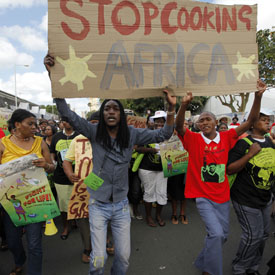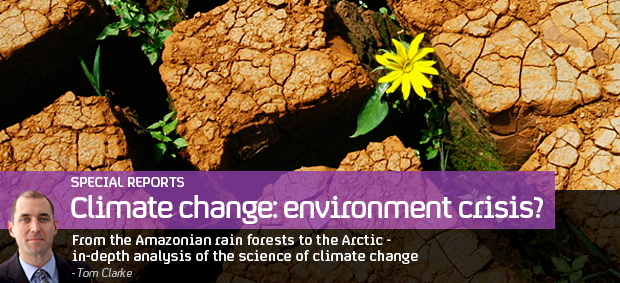Durban climate talks close to deal – but is it enough?
The EU climate commissioner says time is short as she pushes for support on a roadmap for global cuts to emissions – but critics say any deal will be too little, too late.

Delegates from almost 200 countries have until late on Friday to decide whether to commit to signing up to an internationally binding climate deal being pushed by the European Union.
British ministers have joined their counterparts from around the world in Durban, South Africa, in the hope of hammering out an agreement on the best way to avoid a dramatic increase in global temperatures.
The European Union is pushing for a legally binding global deal that would have to be reached by 2015 and then implemented by 2020.
The proposed deal has the backing of over half the 104 countries at the talks, including small island states and the poorest countries, who are led by Gambia and Bangladesh. But delegates say time is running out.
‘Time is short’
EU Climate Commissioner Connie Hedegaard said: “Time is now really short. The success or failure of Durban hangs on a small number of countries who have not yet committed to the roadmap. We need to get them on board today. We do not have too many hours left. If there is no further movement, then I must say I don’t think there will be a deal in Durban.”
If there is no further movement, I don’t think there will be a deal in Durban. EU Climate Commissioner Connie Hedegaard
Since the Kyoto agreement in 1997, the EU has wanted to set emissions cuts that would only come into affect if developing countries also signed up. The current proposal aims to impose binding cuts on the world’s biggest emitters of heat-trapping gasses.
Britain’s climate envoy, Chris Huhne, said it was time for delegations to decide if they wanted a treaty with “real environmental integrity.”
“It’s increasingly clear that the EU is speaking for the vast majority of participants,” he said.
The key countries that the EU needs to persuade are China, the United States, India and Brazil – the world’s largest emitters of greenhouse gases.
Brazil and South Africa have now agreed in principle to legally binding targets on emissions from 2020. Ms Hedegaard is now pushing for India and China to join them, but neither country has yet agreed – with India taking a hard line against the proposed deal.
The US is refusing to sign any legally binding targets unless large developing nations like China do so too. However, even if the deal is agreed, many delegates – particularly those in developing countries – say that 2020 is simply too late to stop runaway climate change.
Fiji’s environment minister Samu Saumutua said: “Cyclones now occur any time of the year, we have floods, in the coastal areas our fresh water supply is now inundated with salt water. We are desperately looking at how we are going to deal with the situation at home.”
Read more: Can climate change deal be done in Durban?
‘If we don’t act now, some of us will die’
Grenada’s Foreign Minister Karl Hood, chairman of the 43-nation Alliance of Small Island States (AODID), was more blunt: “If we don’t act now, some of us will die.”
The World Development Movement echoed Mr Hood’s fears, saying the talks had “failed” on urgent issues.
Murray Worthy, policy officer at the World Development Movement, said: “The UK and EU’s talk of a new global deal is little more than a distraction from their inaction. The EU is failing to take responsibility for its part in causing climate change. It is the world’s poorest people, those least responsible for this crisis, who will end up paying the highest price.”
-
Latest news
-
Taylor Swift’s new break-up album breaks records3m

-
NHS trust fined £200K for failings that led to death of two mental health patients3m

-
Sunak vows to end UK ‘sick note culture’ with benefit reform3m

-
‘Loose talk about using nuclear weapons is irresponsible and unacceptable’, says head of UN’s nuclear watchdog3m

-
‘There wasn’t an Israeli attack on Iran,’ says former adviser to Iran’s nuclear negotiations team7m

-





